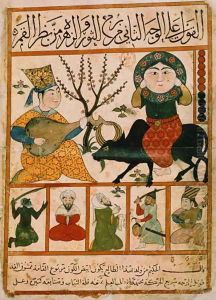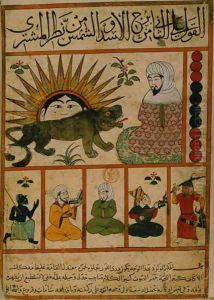Abou Ma'Schar Paintings
Abu Ma'shar al-Balkhi, also known as Albumasar in the West, was a Persian astrologer, astronomer, and Islamic philosopher, hailing from the city of Balkh, which is now part of modern-day Afghanistan. Born on August 10, 787, Abu Ma'shar developed an intellectual trajectory that was influenced by the rich cultural and scientific environment of the Islamic Golden Age, a period that witnessed significant advancements in a wide range of disciplines including the arts, science, and philosophy.
Abu Ma'shar initially studied under the scholars of the Abbasid Caliphate's capital, Baghdad, which was a major center of learning and intellectual debate at the time. He became a student of Albumazar, a prominent scholar, which broadened his horizons in various knowledge domains. Despite his later fame as an astrologer, Abu Ma'shar did not initially pursue this field and was said to have been skeptical about astrology. It wasn't until the age of 47 that he devoted himself to the study of astrology and subsequently became one of its most influential medieval practitioners.
His contribution to astrology and astronomy was substantial. He authored numerous works on these subjects, including 'Kitab al-mudkhal al-kabir' (The Great Introduction to Astrology), which became a foundational text in the field of astrology, and 'Kitab al-milal wa al-duwal' (The Book of Religions and Dynasties), which focused on historical astrology. His astrological texts were translated into Latin in the 12th century and had a profound impact on the development of astrology in Europe during the medieval period.
Abu Ma'shar's work also extended to other areas of knowledge. He wrote about philosophical and scientific topics, including the nature of the soul and the working of the celestial bodies. His approach was to harmonize the philosophical and religious perspectives of his time, contributing to the rich tapestry of Islamic intellectual tradition.
He passed away on March 9, 886, in the city of Wasit, Iraq. Abu Ma'shar's legacy endured beyond his death, influencing not only Islamic scholarship but also the European Renaissance. His works continued to be cited and studied for several centuries, highlighting his lasting significance as one of the key figures in the history of astrology.

